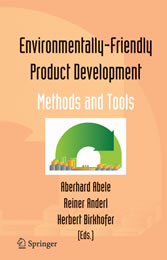Suchen und Finden

Environmentally-Friendly Product Development - Methods and Tools
Development of environmentally friendly products gains an increasing - portance in science and in industry. While product development was strongly dedicated to achieve quality, cost and time targets, environmental issues indirectly had always been under consideration by engineers, see Fig. 1. Furthermore a methodology for the development of environm- tally sound products was missing. Despite of significant progress in using computer aided tools for product development and design, environmental aspects were attended. Computer aided tools typically do not include methods for considering environmental issues enabling the designer to - sess a product's environmental effects. Fig. 1. Vision of Environment as a key target for product development v vi Preface Product related environmental issues are getting more and more political and public awareness. Development of environmentally friendly products has become an action item for both, politics and industry (UNFCCC 1997). Energy consumption is on the agenda and covers pollution and resource saving. Typical topics of directives of the European Union are waste, noise, air pollution, water, nature and biodiversity, soil protection, civil protection and climate change. After the translation into national law the development of environmentally friendly products is a basic approach to contribute to the fulfilment of the topics mentioned above. In the European Community a 'Communication from the Commission to the Council and the European Parliament' on 'Integrated Product Policy' was adopted on th 18 June 2003 (EC 2003).
Alle Preise verstehen sich inklusive der gesetzlichen MwSt.

















